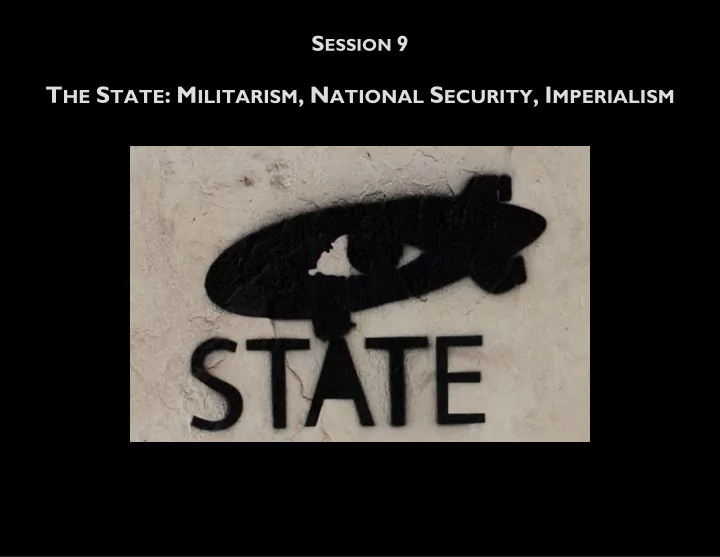

S ESSION 9 T HE S TATE : M ILITARISM , N ATIONAL S ECURITY , I MPERIALISM 1
N ATION AND S TATE UNDER S ECURITY war-making & national security increasing state power The State of Siege Karl Marx, the “state of siege” Vesting interests in regular states of siege A permanent state of siege? Popular socialization. “Absolute Security State” (Astrada, 2010, American Power after 9/11 ) Marx, under a state of siege the state “enmeshes, controls, regulates, superintends and tutors civil society from its most comprehensive manifestations of life down to its most insignificant stirrings, from its most general modes of being to the private existence of individuals; where through the most extraordinary centralization this parasitic body acquires a ubiquity, an omniscience, a capacity for accelerated mobility and an elasticity which finds a counterpart only in the helpless dependence [of the people on the state], in the loose shapelessness of the body politic” Assumptions? Questions? 2
International Politics and Force force & the politics of international war force in all sectors and levels of international affairs politics as an extension of war domestic political transformations—James Madison, 1795: “Of all the enemies of true liberty, war is, perhaps, the most to be dreaded, because it comprises and develops the germ of every other. War is the parent of armies; from these proceed debts and taxes; and armies, and debts, and taxes are the known instruments for bringing the many under the domination of the few….No nation can preserve its freedom in the midst of continual warfare.” 3
War is the New Nation global dominance— “American leadership”— interminable warfare In the 11 years between the end of the Cold War and 9/11, there were 78 separate US military deployments abroad Nearly ceaseless war over the past 218 years of US history Present: Libya, Somalia, Yemen, Syria, Iraq, Afghanistan, and Pakistan war defines the centrality of collective, national being ? 4
National Strategy for Homeland Security 2007 : “To best protect the American people, homeland security must be a responsibility shared across our entire Nation . As we further develop a national culture of preparedness, our local, Tribal, State, and Federal governments, faith- based and community organizations, and businesses must be partners in securing the Homeland….This Strategy also calls on each of you ….As we secure the Homeland, however, we cannot simply rely on defensive approaches and well-planned response and recovery measures. We recognize that our efforts also must involve offense at home and abroad” (White House, 2007, p. 5) “In order to realize this vision, the U.S. will use all instruments of national power and influence—diplomatic, information, military, economic, financial, intelligence, and law enforcement—to achieve our goals to prevent and disrupt terrorist attacks; protect the American people, critical infrastructure, and key resources; and respond to and recover from incidents that do occur. We also will continue to create, strengthen, and transform the principles, systems, structures, and institutions we need to secure our Nation over the long term” (White House, 2007, p. 13) 5
war as everyday life state captures, controls, and occupies more spheres of social & cultural life Inflation of Executive power = security = the people = the state (Astrada, 2010, p. 14) The Absolute Security Agenda system of knowledge, political philosophy, political organization, militarization, surveillance, coercion, interference in the domestic affairs of select states an attempted total penetration of the state into almost all areas of life, under the pretext of security 6
Reordering Sovereignty, Redefining States The unipolar world the international system of states is an extension or an instrument of US power US security = global security the “power to define what a state is and should be” (Astrada, 2010, pp. 6-7) “significantly impacted traditional notions of sovereignty and other basic ordering principles of international relations” (Astrada, 2010, p. 7) 7
Securitized Epistemology the meanings of “security”? waging war against concepts and ideas (Astrada, 2010, p. 6) E.H. Carr: “theories of social morality are always the product of a dominant group which identifies itself with the community as a whole, and which possesses facilities designed to subordinate groups or individuals [in order to impose] its view of life on the community. Theories of international morality are, for the same reason and in virtue of the same process, the product of dominant nations” (quoted in Astrada, 2010, p. 16) 8
Recommend
More recommend